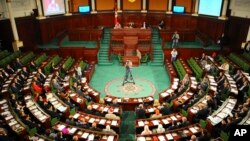At least 10 senior leaders quit Tunisia's ruling party on Wednesday as a wave of resignations in a dispute over the role of the president's son continued to sap the secular movement's strength.
Defections among lawmakers over the past week have cost Nidaa Tounes its parliamentary leadership, causing it to fall in number of deputies behind its Islamist rival Ennahda.
They do not pose an immediate threat to the government, which includes Ennahda, but may complicate efforts to make sensitive cuts to public spending and kickstart an economy hobbled by three major Islamist militant attacks last year.
With a new constitution and free elections, Tunisia has become a model of democratic transition since the fall of Zine Abidine Ben Ali, and has largely escaped the violent upheavals seen in other countries in the 2011 Arab Spring uprisings.
But divisions have been deepening inside President Beji Caid Essebsi's Nidaa Tounes party, whose name means Call of Tunis. It was formed after the 2011 revolt to oppose Ennahda.
A faction led by Mohsen Marzouk, one of its founders, has accused another group led by the president's son, Hafedh Caid Essebsi, of trying to take control of the party.
Marzouk's allies say they fear a return to the autocratic and nepotistic style of the Ben Ali era. The 10 departing leaders, including the ministers for health and social affairs, said they were leaving the party in protest at its "non-democratic path".
Separately, 22 Nidaa Tounes lawmakers have so far officially resigned from its parliamentary group, leaving it with 64 deputies to Ennahda's 69 in the 217-member congress. At least six more have said they will resign.
Nidaa Tounes began negotiations on Wednesday with the Free National Unity Party, a minor liberal group, in an effort to recover some parliamentary strength.





